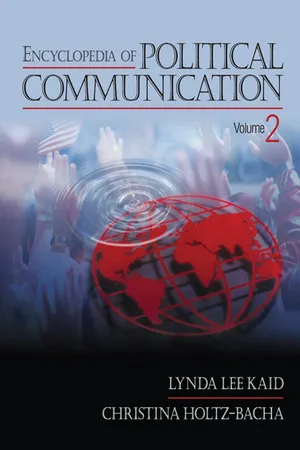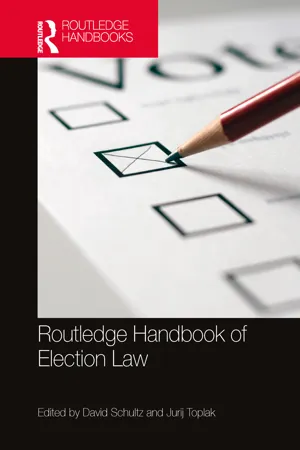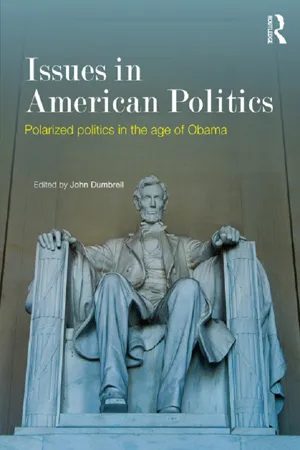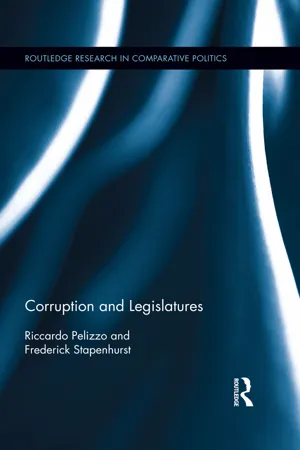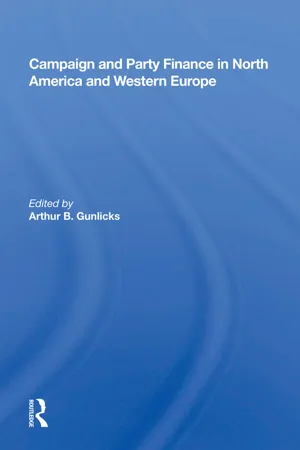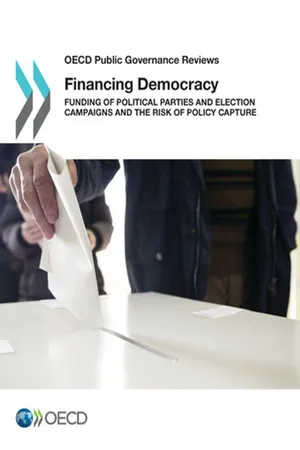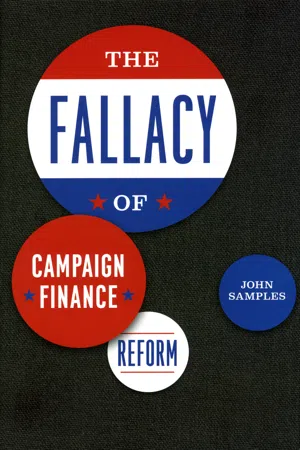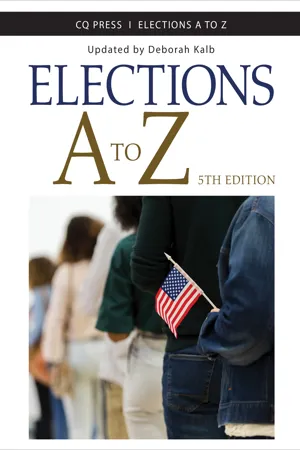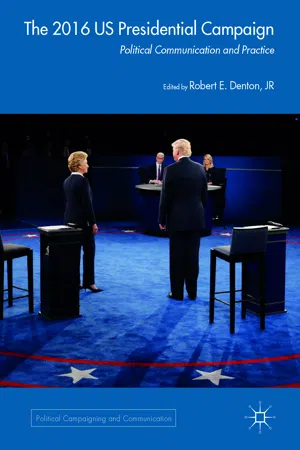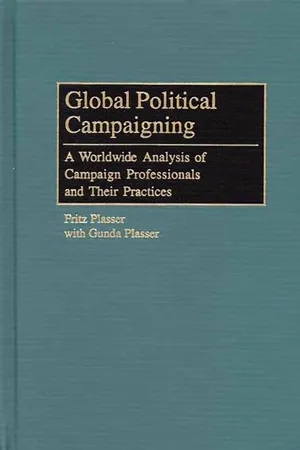Politics & International Relations
Campaign Finance
Campaign finance refers to the funding of political campaigns, including the sources of money and how it is spent. It encompasses regulations and laws that govern the raising and spending of money for political campaigns. The issue of campaign finance is often a topic of debate due to concerns about transparency, influence of money in politics, and potential for corruption.
Written by Perlego with AI-assistance
Related key terms
1 of 5
10 Key excerpts on "Campaign Finance"
- eBook - PDF
- Lynda Lee Kaid, Christina Holtz-Bacha, Lynda Lee Kaid, Christina Holtz-Bacha(Authors)
- 2007(Publication Date)
- SAGE Publications, Inc(Publisher)
77 C AMPAIGN F INANCE Campaign Finance refers to the methods and govern-ing rules under which candidates and political parties obtain the funds necessary to organize political parties and carry out campaigns for public office. In the United States, for example, Campaign Finance is largely achieved through private fundraising by both candidates and parties. Public finance of candidates or parties is exceptional, although it does exist in limited circumstances. In contrast, many democracies in other parts of the world rely almost exclusively on public funding of political parties and candidates, and many utilize a combination of public and private funding. Political parties require funding—more in election years than in others—to create and maintain their orga-nizations, pay staff, recruit candidates and volunteers, and to engage in election campaigns. Over the years political campaigns, especially in Western democra-cies, have become more and more professionalized. The need for funds has increased to hire services such as pollsters, advertising agencies, production compa-nies, political consultants, and media time, including everything from campaign buttons to yard signs to bill-boards, posters, radio and television ads, Web sites, and Internet-based advertising and distribution of spots, position papers, and other campaign materials. In addition, engaging accountants and lawyers to aid in compliance with Campaign Finance regulations is a necessary expense. Campaign Finance has assumed constitutional dimensions in countries such as the United States, where the Supreme Court declared in Buckley v. Valeo in 1976 that virtually every means of communicating ideas in today’s mass society requires the expenditure of money. The distribution of the humblest handbill or leaflet entails printing, paper, and circulation costs. Speeches and rallies generally necessitate hiring a hall and publicizing the event. - eBook - ePub
- David Schultz, Jurij Toplak, David Schultz, Jurij Toplak(Authors)
- 2022(Publication Date)
- Routledge(Publisher)
In many parts of the world, political parties play a crucial part in election campaigns, and it is thus difficult to draw a distinct line between the costs incurred for campaign purposes by political parties and their routine expenses. Political finance is a broad term that covers both Campaign Finance and political party finance and encompasses all rules related to the use of funds for legitimate, irregular, or illicit political activities, including the use of state resources for political purposes and election campaigns. Political finance includes not only campaign expenses, but also costs related to a political party’s day-to-day activities and regular functions. In this context, Campaign Finance is understood as all monetary and in-kind contributions and expenditures collected and incurred by candidates, their political parties, or their supporters for election purposes, while political party finance is defined as all monetary and in-kind transactions made by political parties in their routine activities.To understand political finance, it is of the utmost importance to figure out the chronological imbrication of the four main political finance components – i.e., sources of funding, expenditure limits, reporting and disclosure requirements, and enforcement. To do so, one has to answer the following questions:- Where does the money come from? Sources of financing;
- What is the money spent on? Campaign expenditures and routine party activities;
- Is the money collected and disbursed reported on and disclosed? Reporting and disclosure;
- Is there a supervision mechanism, coupled with a sanctioning system, in cases of infringements upon political finance regulations? Oversight and sanctions.
Why Does Political Finance Matter?
According to Article 25 of the International Covenant on Civil and Political Rights (ICCPR) adopted in 1966:every citizen shall have the right and the opportunity…to take part in the conduct of public affairs…to vote and to be elected at genuine periodic elections which shall be by universal and equal suffrage [and]…to have access, on general terms of equality, to public service in his country.(ICCPR, Article 25)There are very few international standards when it comes to political finance. The main international instruments relevant for assessing political finance are Paragraph 19 of the United Nations Human Rights Committee, General Comment No. 25 to Article 25 of the International Covenant on Civil and Political Rights (ICCPR)2and article 7-3 of the United Nations Convention against Corruption (UNCAC) 2005,3 - eBook - ePub
Issues in American Politics
Polarized politics in the age of Obama
- John Dumbrell(Author)
- 2013(Publication Date)
- Routledge(Publisher)
11 American Campaign Finance in comparative perspective Dean McSweeney Money for election campaigns is both a necessity and a risk. It is essential to create an informed electorate who turn out to vote in large numbers to confer public legitimacy on the outcome. Printed and electronic communications, campaign events, the specialized campaign techniques such as polling, and professionals who supply them all need money. Yet raising the money to fund these essential expenditures has the potential to warp and undermine democratic processes. Inequalities of money can translate into inequalities of information and persuasiveness, restricting the competitiveness of an election. Suppliers of campaign funds may gain leverage in government as a reward for their donations. In seeking funding, parties and candidates may pander to the interests of individual and organized donors. Elections then risk becoming channels of private advantage rather than a means to securing the public interest. These dangers lurk in any democracy, and in each country preventative methods have been introduced, particularly in the last 40 years. Several book-length collections have documented these methods, and the political events and controversies surrounding their inception. 1 Such studies are informative about legal regulations and the circumstances in which they were adopted. This approach is less forthcoming about the broader national political and financial environment which shapes the quantities and sources of money available, and the incentives for investing it for political purposes. Campaign Finance, I suggest, is better understood if we comprehend who needs funds and for what purposes (demand), and what are the sources and quantities of supply. Demand and supply set challenges for regulators - eBook - ePub
- Riccardo Pelizzo, Frederick Stapenhurst(Authors)
- 2014(Publication Date)
- Routledge(Publisher)
Political FinanceIntroduction
Electoral campaigns are at the heart of democracy. Without elections, there is no representation, and without representation there is no democracy. Over the years, however, the cost of electoral campaigning, both for parties and candidates, has increased as because of social, sociological, political, institutional, and technological reasons.Voters have found new forms of political participation, and they can express their political views without having to join political parties. As a result, political parties can no longer count on their membership base. In addition, the cost of political advertising has increased. The combination of these developments has led to a marked increase in the cost of electoral campaigning.Political party finance specialists, such as Michael Pinto-Duschinsky (2002), have argued that rising campaign costs (along with the declining political party revenue from membership fees) have placed considerable pressure on both political parties and candidates to find additional sources of funding. One such source is through electoral corruption, which is one of the sub-types of legislative corruption, as we noted in Chapters 1 and 3 . In other words, electoral (or campaign) corruption—where political parties and candidates seek illicit contributions to cover their campaign costs—is viewed as one of the consequences of the rising costs of campaigning.Given the rising costs of electoral campaigning, various dispositions have been introduced to regulate what can broadly be defined as political party finance. Such dispositions have been introduced to regulate the revenue and expenditures of parties and candidates.1In this chapter, we assess how much the world of political finance regulations has changed in the course of a decade since the publication of Pinto-Duschinsky’s classic work (2002). In doing so, we will analyze the data collected by International IDEA on party income, expenditure, public funding, reporting, and sanctions. - Arthur B. Gunlicks(Author)
- 2019(Publication Date)
- Routledge(Publisher)
The annual reports published by parties in Austria, Germany and Italy (not in Sweden, of course) are audited by certified accountants. This procedure means little more than the fact that a minimum of professional standards is applied when political parties prepare their financial reports. Since no regulation in Western Europe provides for cross-checking of details by an independent enforcing agency, other controlling effects cannot be expected. Any impact specific to the prevalent funding strategy remains unchecked.Conclusion
Crossing the Atlantic ocean from Europe makes everything look different. The political cultures of North America are campaign and candidate oriented. The term political finance connotes Campaign Finance, i.e., money spent in order to influence the outcome of an election. In Western Europe the term political finance is frequently used as a synonym for party financing, i.e., the funding of inter-election routine activities as well as campaigns. In Europe campaigns are run predominantly by parties, in America by candidates (and their specific committees).Major differences between Western Europe and North America result from different approaches towards public funding and publicity regarding political money. In America disclosure of individual donors seems to be at the core of controlling political finance. In Europe the emphasis (if any) is on reporting of the major financial sources and expense items by different parties.In North America public regulation of political finance puts some emphasis on limiting both campaign expenses and individual contributions. Campaign Finance laws limit the amount a candidate may spend for his campaign or the amount a donor may contribute towards the candidate of his choice. Disclosure of the donor's identity and the amount of an individual donation is supposed to help control the flow of private money into campaign coffers. Public subsidies and tax benefits (matching funds) provide incentives for candidates (and parties) to cooperate with such programs of public policy.In Western Europe public subsidies cover most of the financial needs for operating party headquarters on a permanent basis. Reporting of party income and expenses (occasionally debts and assets, too) was implemented in order to promote public control over political finance. Spending limits are rare, and effective contribution limits are unknown in Europe. Massive tax incentive plans for political donations exist in a few countries only.68- eBook - PDF
- OECD(Author)
- 2016(Publication Date)
- OECD(Publisher)
Transparency International (2012), Money, Politics, Power: Corruption Risks in Europe , www.transparency.org/whatwedo/pub/money_politics_and_power_corruption_risks_i n_europe. Transparency International (2008), “Accountability and transparency in political finance: Why, how and what for?”, Working Paper 1/2008. 34 – I.1. ADDRESSING THE RISKS OF POLICY CAPTURE Van Slyke, D. M. (2003), “The mythology of privatization in contracting for social services”, Public Administration Review 63/3, pp. 296-315. Warren, M.E. (2003), “What does corruption mean in a democracy?”, American Journal of Political Science 48/2, pp328-343 Witko, C. (2011), “Campaigning contributions, access, and government contracting”, Journal of Public Administration Research and Theory 21/4, pp. 761-778. I.2. PROMOTING A LEVEL PLAYING FIELD THROUGH BALANCED FUNDING – 35 FINANCING DEMOCRACY: FUNDING OF POLITICAL PARTIES AND ELECTION CAMPAIGNS AND THE RISK OF POLICY CAPTURE © OECD 2016 Chapter 2 Promoting a level playing field through balanced funding This chapter reviews various policy options to promote a level playing field in financing democracy. Allocation of public funding and the rules for private funding continue to require special attention to ensure a level playing field for all stakeholders. To be effective, a comprehensive regulation of political finance should focus on the whole cycle including the pre-campaign phase, the campaigning period itself, and the period once elected officials take office. The chapter also highlights that certain shortcomings in the regulations are particularly vulnerable to exploitation by powerful special interests. Loans, membership fees and third-party funding can be used to circumvent the regulations of private funding. The statistical data for Israel are supplied by and under the responsibility of the relevant Israeli authorities. - eBook - PDF
- John Samples(Author)
- 2008(Publication Date)
- University of Chicago Press(Publisher)
the origins of modern Campaign Finance law 191 gress will retain and enhance their power. More prosaically, those who already have power will create election rules that maximize the likelihood they will win reelection whatever the policy mood of their principals. 5 If we doubt this, we must hold the implausible belief that officeholders are indifferent to their own interests. How do Campaign Finance laws favor those who hold power? We have seen the way spending limits favor incumbents and the way the transac-tion costs associated with contribution limits complicate raising funds. We should also attend to the question of which resources for fighting elections fall within the regulatory net and which do not. Parties use different mixes of resources to fight elections. For example, the Republicans have until recently been “capital intensive”: they rely more than Democrats do on fundraising and campaign spending. Democrats, of course, also depend on money to win elections, but they have other means to produce votes. Labor unions and other allies provide significant volunteer labor to get out the vote for the party. 6 The Democrats also rely on unpaid contribu-tions from the media. Polls have found that most people who report for the national media support the Democrats, and the elite newspapers, edi-torially and to some degree in terms of reporting, lean leftward. 7 For the period treated in this chapter, the focus on money alone (as opposed to other resources) discriminated against the minority party in favor of the majority party. In the 1960s and 1970s the Democratic Party controlled Congress. Members of the party often introduced bills to restrict fundraising and campaign spending, actions consistent with the theory that parties use Campaign Finance law to protect their control of the legislature. That his-tory, however, should not be confused with the theory. Any party with a majority would have an interest in restricting challenges to its incumbents. - eBook - ePub
- Deborah Kalb(Author)
- 2022(Publication Date)
- CQ Press(Publisher)
Deborah Kalb Deborah Kalb Kalb, DeborahCampaign Finance Campaign Finance52 69Campaign Finance
The cost of political campaigns in the United States has risen sharply since the 1950s, fueling intense controversies about the ways candidates for office at all levels of government raise and spend money. Congress, state legislatures, and local lawmaking bodies have responded by adopting laws requiring disclosure of campaign contributions and expenditures and limiting contributions by individuals and organizations.Some facets of Campaign Finance regulation, such as requirements that campaigns and organizations that seek to influence election outcomes must publicly report the sources of the financial donations they receive, have achieved widespread (though hardly unanimous) support.But if the goal of Campaign Finance reformers was to rein in the rate of increase in overall and individual campaign spending—and thereby reduce the impact of money in politics—then the Campaign Finance laws enacted in recent years have not met that standard.Opensecrets.org estimated a record-breaking total of $14.4 billion in combined spending by candidates, political parties, and outside groups during the 2020 election cycle, the year in which the nation elected Democrat Joseph R. Biden as president. That number was more than double the approximately $7 billion figure from the 2016 election in which Republican Donald Trump won the White House, which also had been a record.These overall increases have been fueled by increasingly sophisticated and successful efforts by individual candidates to raise large amounts of campaign money, with the emergence of the Internet as a fundraising tool proving immensely helpful to them. Democrat Barack Obama’s campaign in 2008 broke new ground in its innovative use of web-based fundraising, spending $741 million, obliterating the previous record of $345 million set by Republican George W. Bush in 2004. In fact, Obama’s campaign spending exceeded, by more than $80 million, the combined - eBook - PDF
The 2016 US Presidential Campaign
Political Communication and Practice
- Robert E. Denton Jr(Author)
- 2017(Publication Date)
- Palgrave Macmillan(Publisher)
However, legal analysis of current Campaign Finance focuses on the impact of vast amounts of corporate money in the election cycle. This signaled to some that the U.S. Supreme Court under Chief Justice John Roberts would be increasingly critical Campaign Finance regulation. 36 However, there is some evidence that the influx of campaign funds post-Citizens United do not have the same impact on election results that some feared. It is true that candidates with the most money do not automatically win elections, and that sometimes a candidates’ gaffes or past indiscretions can sink an otherwise well-funded cam- paign. 37 In a longitudinal study of state elections from 1968 through 2008 looking at incumbent reelection and rate of Republican election in state legislatures, Raymond Raja and Brian Schaffner found that caps on campaign spending by corporations have little effect on election outcome. 38 Similarly, Robert Mutch found that in the beginning stages of the 2016 presidential primaries, super-PACs support did not correlate with electoral success. 39 However, the issue of Campaign Finance may not be the money itself, but how the campaign contribu- tions result in political access or political results. 40 Despite this, Bauerly and Hallsrom argue that the influence of super-PACs and Campaign Finance may be unknown because the reporting requirements and voter confusion. 41 What this system of election law has created is a very complex set of regulations that require disclosure and reporting. Studies indicate that the true impact of money varies, but is not exclusively an indicator of election success. There also seems to be an issue between donations and spending. While donations have historically been curbed by the corruption rationale 266 C. MYERS articulated by Buckley v. Valeo, the spending caps have proved to be constitutionally problematic. Reporting requirements have increased to ensure a greater degree of transparency. - eBook - PDF
Global Political Campaigning
A Worldwide Analysis of Campaign Professionals and Their Practices
- Fritz Plasser(Author)
- 2002(Publication Date)
- Praeger(Publisher)
Since the 1994 election the Colombian state partially finances registered political parties, providing campaign resources to the candidates in proportion to votes received. The public financing is based on a reimbursement system. The law allows the candidates to receive additional contributions from persons, companies and organizations. There are no limits to those contributions. The parties and candidates have to inform the National Electoral Council about their income, contributors and overall campaign expenditures, which may not exceed the maximum established by the National Electoral Council. The information is made public. In spite of this control, the influence of the money of narcotics traffickers in political campaigns sub Page 167 stantially increased. The financing of election campaigns with illegal money has been particularly problematic for the democratic process in Colombia, transferring the politicians’ loyalty from their parties to the drug lords, leading to public cynicism and eroding confidence in political institutions. A detailed system of public funding for election campaigns, strict regulations of contributions to candidates or political parties, and legal limitations of overall campaign expenditures characterize the legal framework for financing elections in Russia. The revised electoral law for the Duma election altered the regulations for the registration of parties and candidates and provided new competences for the Central Election Commission (Central’naja Izbiratel’naja Komissija, CIK). This new electoral law also defines upper limits for election expenditures. Including the funds raised by themselves, political parties are allowed to spend at most 41.7 million rubles ($1.7 million) and regional candidates have a maximum of 1.7 million rubles ($65,000). According to the estimates of Russian experts, the actual campaign budgets at the parliamentary elections of 1999 were 10 times higher.
Index pages curate the most relevant extracts from our library of academic textbooks. They’ve been created using an in-house natural language model (NLM), each adding context and meaning to key research topics.
